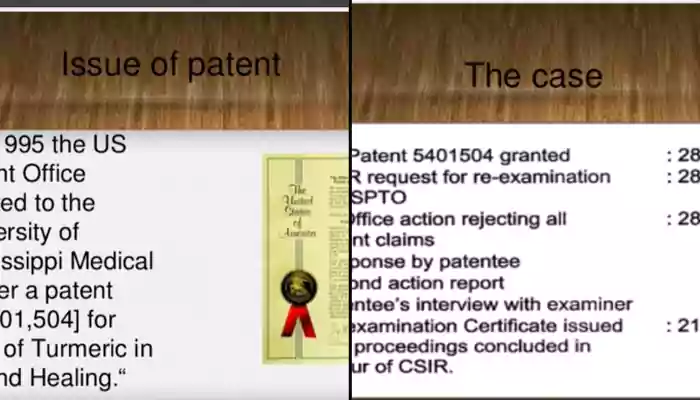Biopiracy: How India won the battle with USA over turmeric patent?

From diabetes, osteoarthritis, obesity to liver diseases, adding turmeric to your diet could help reduce inflammation and guard against many infections.
But, do you know that two countries have fought a long legal battle to get the patent over turmeric? Yes, you heard it right, India and USA fought a legal battle couple of years ago eventually India got the patent for turmeric. How India enforced the US Patent and Trademark Office (PTO) to revoke a 'contentious patent' granted in 1995 to scientists in the USA on the use of powdered form of turmeric (Curcuma longa) is a long history often overlooked. This article is all about this case.
What is biopiracy?
Before we start the article, let's have a clear idea about biopiracy, which is a new form of commercial exploitation. As per definition, Biopiracy refers to "appropriation of the knowledge and genetic resources of farming and indigenous communities by individuals or institutions seeking exclusive monopoly control (usually patents or plant breeders rights) over these resources and knowledge."Since the beginning of biotechnological innovation and the pharmaceutical patenting, traditional knowledge based on biochemical/genetic resources have been commercially exploited to assert control over what has already been accepted in "normal parlance as traditional knowledge by establishing a false sense of novelty and non-obviousness." Yes, it sounds like poaching scientific knowledge.

The legal battle:
Two Indian origin researchers, Suman K. Das and Hari Har P. Cohly of the University of Mississippi Medical Center, put a claim to the US PTO that they had discovered the healing properties of turmeric. The patent was granted in 1995. However, this wound healing properties of turmeric of haldi was known for years and mentioned in ayurveds centuries ago.Following this, the Council of Scientific and Industrial Research (CSIR) claimed for reexamination in the US PTO.
The CSIR hired a US patent lawyer and spent approximately $15,000 to fight the case. The Indian agency collected and presented wide range of documents like scientific publications to books on "home remedies" and ancient Ayurvedic texts on "Indian systems of medicine".
After a long courtroom battle, on 13th August, 1997, the US PTO withdrew the patent and gave judgement in favour of CSIR citing "turmeric, a native Indian plant, had been used for centuries by its people for wound healing, and so lacked the novelty criterion required for patenting."
This victory was the first time that any patent related case by a developing country has won. Earlier, Indian agency lost Neem patent to USA.
The then CSIR's director, Ragunath Mashelkar, said "the success of the case had far-reaching consequences for the protection of the traditional knowledge base, not only in India but in other Third World countries". He said the "case also highlights the importance of documenting traditional knowledge, to provide evidence of prior knowledge."
Medicinal properties of turmeric:
The medicinal properties of turmeric are vast-ranging. The active ingredient in turmeric, called curcumin is a potent antioxidant. In India, it has been used for centuries as a herbal medicine to treat rheumatoid arthritis, skin cancer, chronic anterior uveitis, small pox, conjunctivitis, chicken pox, wound healing, liver ailments, urinary tract infections, and so on.Mashelkar in an interview stated the importance of this legal battle: "India fought the turmeric patent not for financial reasons, but to uphold national pride and to dispel unfounded fears that India was incapable of protecting its traditional knowledge base."


.WEBP)









